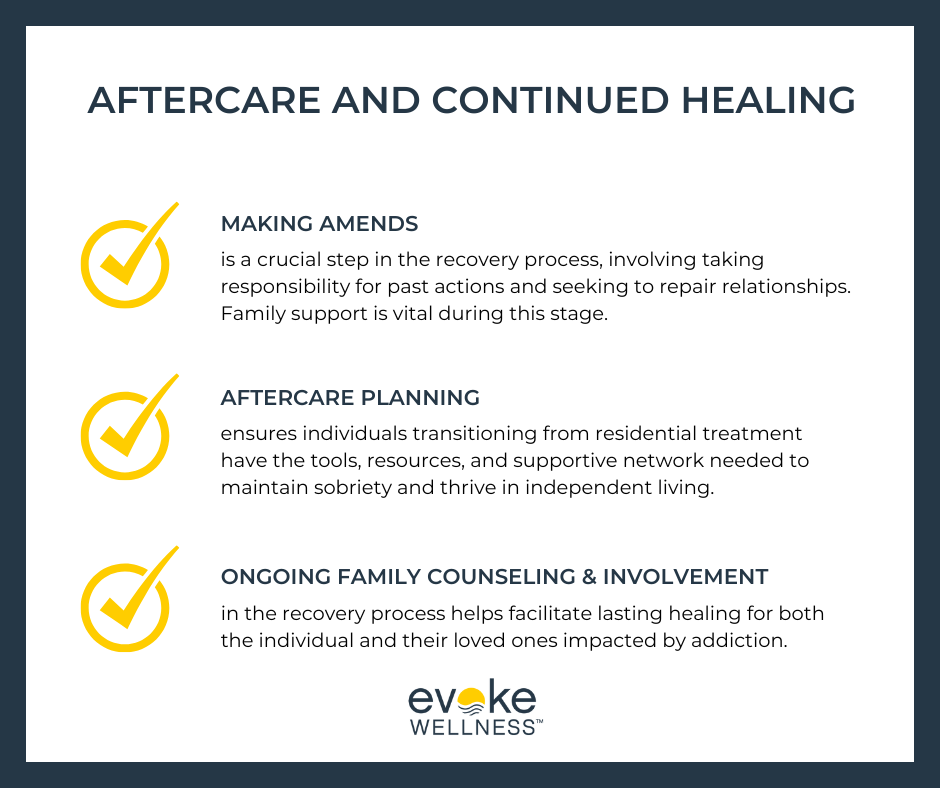As you navigate the challenging journey of addiction recovery, understanding the role of family dynamics is crucial. Your family environment can significantly influence both the development of substance abuse disorders and the path to recovery.
At Evoke Wellness at Coconut Creek, we recognize that addressing family dynamics is integral to successful long-term recovery. This article will explore how family relationships impact addiction and provide strategies for fostering a supportive family environment during the recovery process.
Call (833) 969-3318 to speak with our compassionate team, or reach out online and schedule an appointment to begin a healing journey.
The Role of Family in Addiction and Recovery
Understanding Family Dynamics
- Addiction impacts the entire family, not just the individual struggling with substance abuse. Family members can inadvertently enable addictive behaviors, perpetuating a cycle of codependency and addiction.
- Codependent relationships often involve subjugating one’s needs, making excuses, or removing consequences for the addicted loved one’s actions. This dynamic can prolong the addiction cycle and delay seeking treatment.
Fostering a Supportive Environment
- Comprehensive addiction treatment programs address both the individual’s substance use disorder and the family dynamics contributing to or resulting from addiction.
- Family therapy sessions and educational workshops help families understand addiction’s impacts, develop healthier communication patterns, and build a strong support system for recovery.
- Residential treatment facilities provide a safe, structured environment for individuals to break free from addiction while receiving customized therapies like Cognitive Behavioral Therapy (CBT) and Dialectical Behavior Therapy (DBT).
How Family Dynamics Contribute to Addiction
Dysfunctional Communication Patterns
- Poor communication within families can lead to emotional disconnection, lack of support, and unresolved conflicts. This environment fosters a sense of isolation and the use of substances as a coping mechanism. According to a study, individuals from families with ineffective communication are more likely to develop addictive behaviors.
Codependent Relationships
- Codependent relationships within families, where one person subjugates their needs for the other, can enable and reinforce addictive behaviors. As noted by Evoke Wellness, this destructive cycle creates an environment where the addict craves substances, and the codependent partner enables the addiction to meet their own emotional needs.
Trauma and Attachment Issues
- Childhood experiences of trauma, abuse, or neglect can disrupt healthy attachment and increase the risk of substance abuse as a way to self-medicate and numb emotional pain. Evoke Wellness at Coconut Creek emphasizes addressing past traumas as a crucial component of their comprehensive treatment approach.
Lack of Emotional Support
- Families that fail to provide emotional support, validation, and a safe environment can contribute to the development of addiction. Individuals may turn to substances to cope with feelings of loneliness, low self-esteem, or emotional distress, further fueling the cycle of addiction.
By addressing these family dynamics through specialized therapies, educational workshops, and ongoing support, Evoke Wellness at Coconut Creek’s family program aims to foster healing, improve communication, and support sustainable recovery for individuals and their loved ones.
Common Family Roles That Enable Addiction
The Codependent Caretaker
- Often driven by a desire to please or control, the codependent caretaker prioritizes the needs of the addicted loved one over their own well-being. This role involves making excuses, denying issues, and enabling destructive behavior patterns.
- As outlined on the Evoke Wellness blog, codependency frequently accompanies addiction, with codependent individuals struggling to establish healthy boundaries and neglecting self-care to cater to their loved one’s needs.
The Avoidant Bystander
- Fear of conflict or confrontation can lead some family members to adopt an avoidant role, choosing to ignore or minimize the addiction issue rather than directly addressing it.
- By remaining passive observers, avoidant bystanders unintentionally enable the addiction to persist without prompting positive change or accountability. This dysfunctional dynamic often stems from denial or a misguided attempt to keep the peace.
The Judgmental Critic
- Harsh criticism, blame, and disparaging comments characterize this toxic family role. Rather than offering compassionate support, the judgmental critic fosters an atmosphere of shame and resentment.
- Such negative reinforcement rarely motivates recovery. Instead, it exacerbates the isolation, low self-worth, and emotional turmoil commonly linked to substance abuse.
The Rescuer Complex
- With a misguided sense of responsibility, the rescuer takes it upon themselves to “fix” the addicted loved one, often through enabling behaviors like bailing them out of difficulties or shielding them from consequences.
- This unhealthy dynamic reinforces the addictive patterns while depleting the rescuer’s own resources and well-being. Genuine recovery requires empowering the individual to take personal accountability.
Through family therapy programs like those offered at Evoke Wellness, families can identify and overcome these enabling roles, fostering an environment conducive to lasting recovery through mutual understanding, healthy boundaries, and unconditional support.
The Importance of Family Support in Recovery
A Holistic Approach
Addiction is a complex issue that affects not just the individual but the entire family system. At Evoke Wellness at Coconut Creek, we recognize the vital role that family support plays in the recovery journey. Our comprehensive treatment approach incorporates a dedicated Family Program that aims to educate, involve, and empower loved ones throughout the healing process.
Rebuilding Connections
Substance abuse often strains relationships, eroding trust and communication within families. Through family therapy sessions, our clients and their loved ones work to rebuild these bonds, fostering an environment of understanding and open dialogue. This strengthens the family’s ability to provide a solid foundation for the individual’s long-term recovery.
A United Front
By participating in educational workshops and support groups, family members gain valuable insights into the complexities of addiction and learn effective coping strategies. This shared knowledge empowers them to become active partners in the recovery process, offering unwavering support and accountability for their loved one.
According to recent statistics, family involvement in treatment programs significantly increases the chances of achieving and maintaining sobriety. By working together as a united front, families can create a nurturing environment that promotes healing, growth, and lasting recovery.
Family Counseling and Therapy for Addiction Treatment
Understanding Family Dynamics
Addiction profoundly impacts family relationships and dynamics. Codependent behaviors like enabling, caretaking, and poor boundary-setting can develop as loved ones try to cope with an addict’s destructive choices. These dysfunctional patterns reinforce the addiction cycle and erode self-worth for all involved.
Healing Through Counseling
Family counseling and therapy provide a safe space to break codependent cycles, rebuild trust, and develop healthier ways of relating. Through evidence-based approaches like cognitive behavioral therapy (CBT) and dialectical behavior therapy (DBT), families can:
- Identify enabling behaviors and set firm boundaries
- Improve communication skills and conflict resolution
- Process resentment, anger, and other difficult emotions
- Restore self-esteem and personal accountability
A Comprehensive Approach
Truly addressing addiction’s impact requires a personalized, holistic treatment plan that involves the entire family system. Complementary therapies like mindfulness, equine therapy, and peer support groups further promote emotional healing and relational repair. With professional guidance, families can break free from codependency and rebuild on a foundation of mutual understanding and respect.
Family Dynamics in Addiction and Recovery FAQ
Role of Family in Addiction
A strong family unit can provide a vital support system during addiction recovery. However, dysfunctional family dynamics often contribute to substance abuse in the first place. According to one study, a stressful family environment increases the risk of alcohol use disorder. Poor communication, lack of emotional support, and enabling behaviors enable addictions to take root.
Family Involvement in Treatment
Involving family members throughout treatment is crucial for lasting sobriety. At Evoke Wellness, their family program addresses codependency patterns contributing to addiction. Through education, therapy, and support groups, families learn healthy boundaries and communication strategies. This holistic approach empowers everyone to break destructive cycles.
Making Amends with Family
Making amends is a vital step in repairing relationships damaged by addiction. This involves taking accountability, offering sincere apologies, and actively working to regain trust over time. Cognitive Behavioral Therapy and Dialectical Behavior Therapy at Evoke teach coping skills to manage emotions and handle conflicts productively during this process.
Rebuilding Family Bonds
With commitment from all parties, families can rebuild stronger bonds in recovery. Consistent effort through family therapy sessions, open dialogue, and setting realistic expectations allows for healing. An alumni support network reinforces continued growth. Though challenging, mending relationships enables a circle of encouragement for sustained sobriety.
Conclusion
In conclusion, family dynamics play a crucial role in both addiction development and recovery. Recent studies show that family involvement in treatment can increase recovery success rates by up to 50% (SAMHSA, 2021). As you navigate the challenging journey of addiction recovery, remember that healing is possible not just for the individual, but for the entire family system. By addressing underlying family issues and working together, you can create a supportive environment that fosters long-term sobriety and improved relationships for all involved.
Begin Your Journey With Evoke Wellness at Coconut Creek
Evoke Wellness at Coconut Creek is a full-service addiction treatment facility serving Florida residents. We base each of our programs on the individual’s severity of symptoms and use a combination of evidence-based therapies and holistic approaches to address the needs and recovery goals of the patient. If you or a loved one is struggling, help is available today. Call (833) 969-3318 to speak with our compassionate team, or reach out online and schedule an appointment to begin a healing journey.



